Jul 9, 2024 11:35 AM
Trumpeter, Educator Jim Rotondi Dies at 61
Jim Rotondi, a renowned hard-bop trumpeter, composer and educator, died suddenly on July 7 at a hospital in France. He…
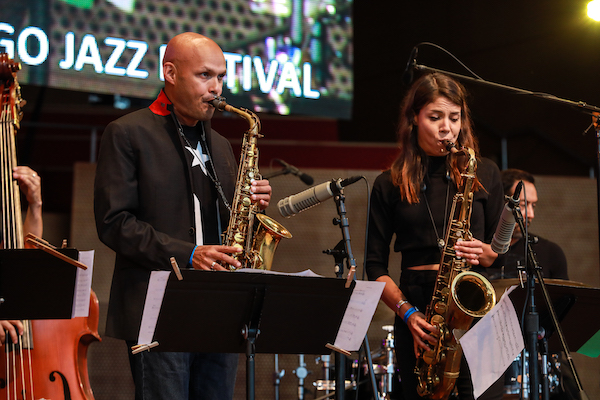
Miguel Zenón and Melissa Aldana perform Sunday at the Chicago Jazz Festival with Latino-America Unida, a new collective that also included drummer Antonio Sánchez, bassist Ricky Rodriguez and pianist David Virelles.
(Photo: Mark Sheldon)Epic and epochal performances defined the 41st annual Chicago Jazz Festival, which ran Aug. 29-Sept. 1 at Millennium Park.
Ambitious moments included The Art Ensemble of Chicago celebrating its 50th anniversary with expanded personnel and new repertoire, and Latino-America Unida verifying its star power was for substance, not show.
History also was marked by singer Freddy Cole, 88, in a valedictory performance brightened by memories of his brother Nat “King” Cole, and the fest’s finale, a blazing set of Latin jazz from the style-summiting sextet of composer-pianist Eddie Palmieri. Bandleaders Christian McBride, Cécile McLorin Salvant, Ambrose Akinmusire and Camila Meza also made grandiose musical statements during the weekend.
About 500 musicians participated in 125 sets, according to the Department of Cultural Affairs and Special Events, which organizes the extravaganza. The run included performances in outlying neighborhoods prior to the four-day culmination at Millennium Park. But during Labor Day weekend, most of the action was at two side stages—separated by about 100 yards in the middle of the park—and at the Pritzker Pavilion, where evening concerts took place.
Chicago prides itself on a rich and burgeoning scene, and the nonprofit Jazz Institute of Chicago, largely responsible for curating the festival, took pains to book high-quality, stylistically diverse local and regional artists that led up to the nationally known acts. A wealth of talent, often presented simultaneously, made for difficult choices.
Hear witty singer-pianist Ben Sidran at the top of his game or take in a set by Chicago polyglot Ben Lamar Gay? Make a run between Juli Woods’ Big Bari Band—which included guitarist Mike Allemana—and trumpeter Russ Johnson’s dream team? Alleman’s own After Dark sextet also was opposite Dee Alexander’s renditions of Billie Holiday tunes. And a rooftop stage above the main pavilion offered another option: professional-level high school-age groups.
A brass band and New Orleans-inspired parade krewe also roamed the park.
Although myriad tourists and Chicagoans came just to mill about and take selfies, the city estimated about 150,000 visitors during the fest’s four-day span. Sets like the jovial collaboration of bop-to-funk guitarist George Freeman, 92, and 67-year-old blues harmonica player Billy Branch, were easily enjoyable. However, the 15-piece Art Ensemble, among several other major bookings, provided conceptual and sonic challenges.
Though departing from the unforgettable small group settings of its Delmark, BYG and Nessa recordings starting in 1969 or its long tenure on ECM, the Art Ensemble orchestra retains its declared mission to embody “Great Black Music, Ancient to the Future,” and push boundaries with creativity front and center. Original members Lester Bowie, Malachi Favors and Joseph Jarman have died, so surviving cofounder Roscoe Mitchell and longtime drummer Famoudou Don Moyé have tapped younger exemplars of their values—flutist Nicole Mitchell, cellist Tomeka Reid, bassists Jaribu Shahid, Sylvia Bolognesi and Junius Paul—for accompaniment.
Multireedist, bells-playing composer Roscoe Mitchell, a 2019 NEA Jazz Master at age 79, has reinforced the Art Ensemble’s complexity and intensity. At his instigation, the group expanded its scope, demanding spontaneous, intersectional brilliance from all players. In one central episode, trumpeters Hugh Ragin and Fred Berry faced off against Mitchell, circular breathing ferociously on sopranino. Meanwhile, flutist Mitchell (no relation) kept her stream of melody flowing throughout the troupe’s shifts in density, dynamics, meter and propulsion, some of which necessitated the services of a conductor.
Members of the band, after they’d marched offstage, continued playing joyously in the wings.
But it was Latino-America Unida that embodied the most highly charged collective. Representing a broader Pan-American legacy—its members hailing from Puerto Rico, Cuba, Chile and Mexico—the players each expressed themselves, bonding in the effort. Saxophonists Miguel Zenón and Melissa Aldana traded phrases at top speeds, outdoing each other and themselves, and were fed by the rhythm section of drummer Antonio Sánchez, bassist Ricky Rodriguez and pianist David Virelles. The impressive premier promised great things to come.
The exhilarating fest-ender by Palmieri’s band, though, capitalized on his 60-plus years of immersion, development, innovation and refinement of Afro-Caribbean elements, especially the five-beat clavé. At his electric keyboard, 82-year-old Palmieri spoke of being influenced by Herbie Hancock, Thelonious Monk and McCoy Tyner, and his unaccompanied introductions to tunes often nodded to such players. But it was the synchronized, syncopated rhythms he learned from the great Latin ballroom orchestras of the 1950s and early ’60s—layered at exalted tempi by Camilo Molina on timbales and Vincent “Little Johnny” Rivero on congas, and buoyed by bassist Luques Curtis—that were irresistible. Gutsy solos by alto saxophonist Louis Fouche and trumpeter Jonathan Powell heightened the excitement Palmieri generated. It resulted in dancing in the aisles, always the best way to end a festival—and prove its success. DB
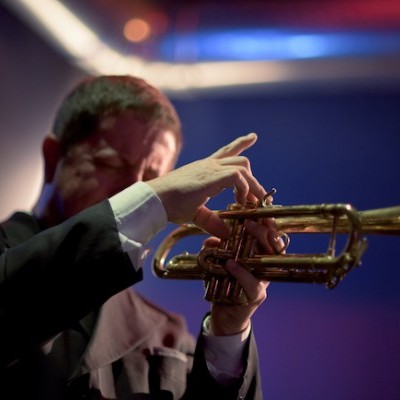
Jim Rotondi was acclaimed for his wide, round trumpet tone, remarkable virtuosity and assured swing.
Jul 9, 2024 11:35 AM
Jim Rotondi, a renowned hard-bop trumpeter, composer and educator, died suddenly on July 7 at a hospital in France. He…
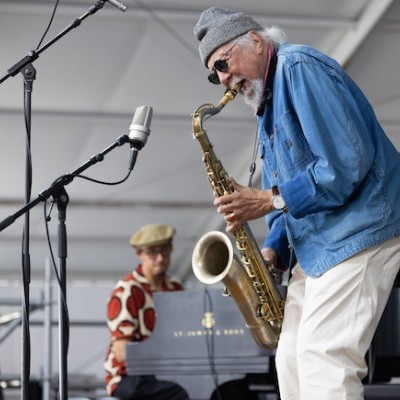
Charles Lloyd, seen here at the 2024 New Orleans Jazz & Heritage Festival, makes DownBeat Poll history!
Jul 11, 2024 12:23 PM
The incomparable Charles Lloyd swept the 72nd Annual DownBeat Critics Poll, becoming the first artist ever to earn…
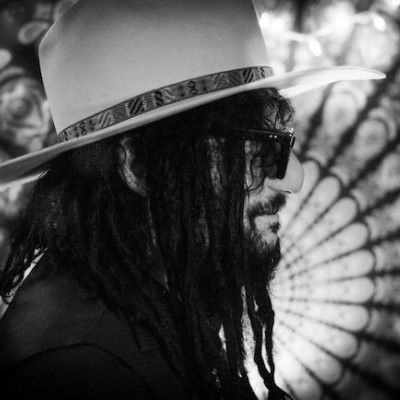
“Being president of Blue Note has been one of the coolest things that ever happened to me,” Was said. “It’s a gas to serve as one of the caretakers of that legacy.”
Jun 4, 2024 12:21 PM
Sitting with Don Was is a comfortable and unhurried exercise. He may seem slightly reserved at first, but ideas and…
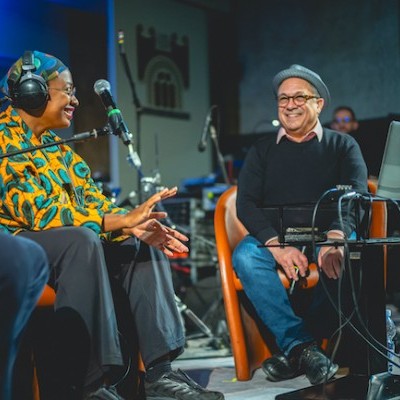
“She reminds me of my childhood and makes we want to cry,” Cécile McLorin Salvant, pictured here with writer Ashley Kahn, said of Dianne Reeves.
Jun 11, 2024 12:31 PM
Italy’s Umbria Jazz Winter is one of those rare annual festivals that not only coincides with a major holiday —…
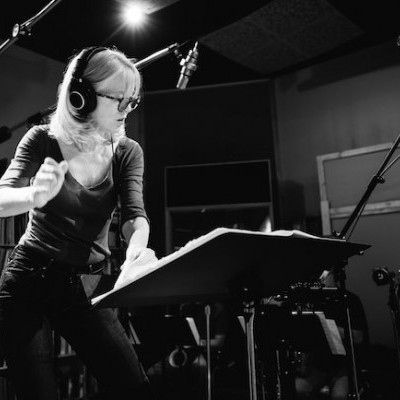
Maria Schneider said of Decades, her new compilation release: “I just wanted to create something, put it in a beautiful box and say, ‘Look at what we did.‘”
Jun 18, 2024 12:00 PM
Maria Schneider opened the sleek black box and placed it on a coffee table in her Manhattan apartment. Inside lay the…